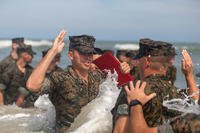You may have seen them standing outside convenience stores, those guys dressed in camo that vaguely resembles a uniform. They have signs saying claiming they are charities that help veterans. Are they legit?
Well, not all of them are.
The Federal Trade Commission, along with law enforcement officials and regulators from offices in every state, DC, American Samoa, Guam and Puerto Rico, announced more than 100 actions and a consumer education initiative in “Operation Donate with Honor”.
The action was a crackdown on fraudulent charities that con consumers by falsely promising their donations will help veterans and service members.
“Americans are grateful for the sacrifices made by those who serve in the U.S. armed forces,” said FTC Chairman Joe Simons. “Sadly, some con artists prey on that gratitude, using lies and deception to line their own pockets. In the process, they harm not only well-meaning donors, but also the many legitimate charities that actually do great work on behalf of veterans and service members.”
Two Charities Face Federal Charges
Help the Vets
Neil G. “Paul” Paulson, Sr. and Help the Vets, Inc., (HTV) will be banned from soliciting charitable contributions under settlements with the FTC and the states of Florida, California, Maryland, Minnesota, Ohio and Oregon, for falsely promising donors their contributions would help wounded and disabled veterans.
The defendants were charged with violating federal and state laws related to their actions. According to the FTC’s complaint, HTV did not help disabled veterans, and 95 percent of every donation was spent on fundraising, administrative expenses, and Paulson’s salary and benefits.
Operating under names such as American Disabled Veterans Foundation, Military Families of America, Veterans Emergency Blood Bank, Vets Fighting Breast Cancer, and Veterans Fighting Breast Cancer, HTV falsely claimed to fund medical care, a suicide prevention program, retreats for veterans recuperating from stress, and veterans fighting breast cancer.
In addition to the ban on soliciting charitable contributions, the proposed settlement order bans Paulson from charity management and oversight of charitable assets. To ensure that donors to HTV are not victimized again, HTV and Paulson must destroy all donor lists and notify their fundraisers to do so.
The order imposes a judgment of $20.4 million, which represents consumers’ donations from 2014 through 2017, when HTV stopped operating. The judgment will be partially suspended when the defendants have paid a charitable contribution to one or more legitimate veterans charities recommended by the states and approved by the court. Paulson must pay $1.75 million – more than double what he was paid by HTV – and HTV must pay all of its remaining funds, $72,000.
Veterans of America
The FTC charged Travis Deloy Peterson with using fake veterans’ charities and illegal robocalls to get people to donate cars, boats and other things of value, which he then sold for his own benefit.
The scheme used various names, including Veterans of America, Vehicles for Veterans LLC, Saving Our Soldiers, Donate Your Car, Donate That Car LLC, Act of Valor, and Medal of Honor. Peterson allegedly made millions of robocalls asking people to donate automobiles, watercraft, real estate, and timeshares, falsely claiming that donations would go to veterans charities and were tax deductible.
In fact, none of the names used in the robocalls is a real charity with tax exempt status. Peterson is charged with violating the FTC Act and the FTC’s Telemarketing Sales Rule.
At the FTC’s request, a federal court issued a temporary restraining order prohibiting Peterson from making unlawful robocalls or engaging in misrepresentations about charitable donations while the FTC’s enforcement action is proceeding.
State Enforcement Actions
States also identified and charged several charities and fundraisers who sought donations online and via telemarketing, direct mail, door-to-door contacts, and at retail stores. These groups falsely promised to help homeless and disabled veterans, to provide veterans with employment counseling, mental health counseling or other assistance, and to send care packages to deployed servicemembers.
Some actions charged veterans charities with using deceptive prize promotion solicitations. Others targeted non-charities that falsely claimed that donations would be tax deductible. Some cases focused on veterans charities engaged in flagrant self-dealing to benefit individuals running the charity, and some alleged that fundraisers made misrepresentations on behalf of veterans charities or stole money solicited for a veterans charity.
Nationwide Education Campaign
As a result of these actions, the FTC and its state partners are launching an education campaign to help consumers avoid charity scams and donate wisely.
The FTC has new educational materials, including a video on how to research charities, and two new infographics. Donors and business owners can find information to help them donate wisely and make their donations count at FTC.gov/Charity.









